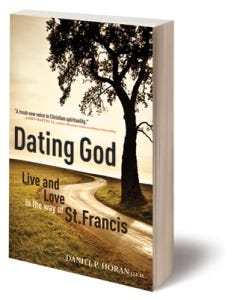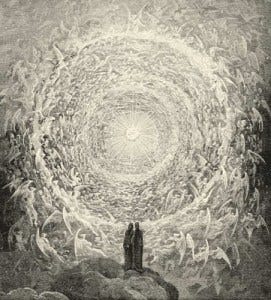Dating and Dating God
When I first offered to review Dan Horan’s Dating God a couple months back, in my mind I had anticipated doing a more or less traditional book review: give an overview of the basic goal of the book, offer some highlights and critiques, and suggest what audience I felt would appreciate it most. And I will still include some of that (although there are several other excellent reviews if that’s what you’re looking for). But, given the way in which context shapes our theology, I thought I would take his central metaphor of “dating” seriously and reflect on the book in light of my relationship with my girlfriend, Paige.
In fact, she and I read the book together. She has spent most of the last year volunteering at a Passionist retreat center outside Belfast. One of the ways we have managed being a long distance couple has been reading books together (some successfully, some not) and discussing them.
Fittingly, the chapter of Dating God that we both found most resonant was chapter three, “The Long-Distance Relationship: Loneliness.” Here, Horan notes that in long-distance relationships we become “much more reliant on the spoken and written word to communicate” precisely because we can’t be physically present to one another (44). Even when Paige and I can see each other via Skype, the screen flattens our face and the difference between camera and screen means we never really make eye contact.
It can be useful to see our relationship with God as a long distance relationship, says Horan, particularly in those times when we feel distant from or even abandoned by God. He notes the power of the psalms of lament, particularly Psalm 22 with its “O my God, I cry by day, but you do not answer; and by night, but find no rest” (48). The Psalmist experiences the pain of separation, surely, but particularly the pain of being abandoned. These periods might seem like the best time to “bail,” to “get while the gettin’s good.”
Yet despite this pain, the Psalmist continues to cry, continues to pray, continues to communicate with God, precisely in the expectation that there will be an answer and that there is still a meaningful relationship there. For Horan, the relationship with God, like my long-distance relationship with Paige, takes a tremendous amount of work and, frankly, hope on our part. Despite the separation, we believe that this separation will come to an end, that we will be together in the future: with Paige, when she returns from Ireland; with God, in the Beatific vision. But this hope rests in large part on our continued intentional participation in that relationship.
I have focused here on the long distance relationship chapter because, as is clear, its theme resonates with me – in my relationship with Paige and my relationship with God. Long distance isn’t a perfect metaphor (I get much more explicit responses when I communicate with Paige than with God, so far as I can tell), it does strike at my experience of feeling apart from the one I love. I suspect that the success or failure of any work of contemporary spirituality depends on how a given reader receives that work in his or her context. In the case of Dating God, the relevant question would be the reader’s experience of dating. Horan describes the experience he is getting at as:
“Replete with emotional ups and downs, euphoric highs and depressing lows, energy, affection, and fear, our everyday experiences of getting to know another in an increasingly intimate manner might help us to envision our relationship with God in a new and ever deepening way.” (5)
And for those readers who hear their dating experiences in this description, I think this book would be a worthwhile read. But for those whose experience of dating has been transient, shallow, manipulative, abusive, or any of a variety of other descriptors, this book’s metaphor may not be the one for them. As an example, I think of one of my students this past year who, several times in class, cited the “hook up culture” at BC as morally problematic in terms of how it trains young adults to consider the sexual utility of others without interest in emotional intimacy. I would probably be less likely to recommend Horan’s text in those sorts of situations precisely because there the dating metaphor might bring more darkness than light.
Then again, it’s possible it could serve to interrupt those more negative views of dating, but I’m not wholly convinced of that.
So on the whole, I enjoyed reading Dating God, I enjoyed reading it with Paige, and I suspect it will be a useful spirituality text for many trying to figure out their relationships, both romantic and spiritual.






